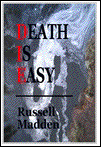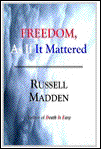 |
 |
|
|
 |
 |
|
|
In reading Loren Lomasky's review of David Kelley's Unrugged Individualism (Reason, 4-97), I found myself wondering if he had read the same work I did.
As one of those egoists/individualists/Objectivists (frankly, I find the term "Randian" lacking in a certain amount of respect and...benevolence) which Mr. Lomasky evidently dislikes, I obviously disagree with his discussion regarding the nature of benevolence. In my ten years of practicing Objectivism, my day-to-day application of my philosophy hardly matches the rather dark and bitter picture Mr. Lomasky paints. Perhaps Mr. Lomasky has a more cynical view of human nature than do I...or perhaps he simply cannot bear the thought of divorcing benevolence from the altruism he admires. The latter hardly holds exclusive claim to the term, even though some of his argument sounds almost circular: benevolence is a type of altruism; Kelley says it is not; because he rejects altruism, what he describes cannot be benevolence.
Much of Mr. Lomasky's discussion appears to focus on a straw-man view of "selfishness." If someone does not immediately and directly benefit from some action, Mr. Lomasky seems to think such a person cannot claim to be selfish. Perhaps that conclusion might fit with a view of people as homo economicus but it hardly matches my view of what Objectivism says. Indeed, the economic view of people confuses purposeful thought/action with rational thought/action.
I can and often do "accept...less so...someone else can have more," and yet I still reject altruism (defined as gaining no personal benefit from one's actions; placing others' needs ahead of or in opposition to one's own; knowingly engaging in sacrificial actions in which one gives up more than one gains). I engage in benevolent behavior all the time with my wife, friends, and relatives. In grad school, I, the selfish Objectivist, rather than my self-professed altruistic classmates was the one who ran errands for the departmental secretary.
It requires a truncated view of life to focus so narrowly and place such emphasis on the short-term in evaluating selfish acts rather than integrating present actions with long-term consequences. When I was a president of an Objectivist group, one person asked me how I could possibly justify opening the door for someone since it would cost me effort and time and convenience. This criticism seems akin to Mr. Lomasky's claim that only tit-for-tat scenarios can be considered selfish. I have stopped to help stranded motorists, not because I foolishly supposed they might one day see me in similar straits and -- like the lion and the mouse &endash;&endash; stop to help me. I have done so because they were human beings in need of help and because others have stopped to help me on occasion. I see no chasm between such behavior and egoism.
When I form discussion groups, write letters to the editor, or encourage rationality, I do so in the selfish hope that I may one day help create a more free and moral society, one from which I would personally benefit. I also happen to think that everyone else would benefit from such a society, too. But that is not what motivates me to engage in costly behavior that has no immediate payoff (like writing this letter when I could be working on a new book or article). Apparently, Mr. Lomasky thinks that no egoist would engage in such speculative (in terms of pay-off) behavior and that no true egoist would ever bother to vote. But his example of the Prisoner's Dilemma is fallacious. Such interesting yet severely delimited sociological tests do not represent the open-ended, dynamic interactions of real life. (A discussion of my rejection of much of social science methodology would explain this statement more fully.)
Mr. Lomasky's either-or depiction of "benefit" likewise suffers from the short-term/long-term issues mentioned above. His "consistently selfish individual" would hardly be consistent nor truly selfish if he operated only on "range of the moment, concrete-bound" considerations. There is no necessary dichotomy between direct benefit and the indirect "general social practice of uncompensated assistance" he says is immaterial to those such as me.
Justice, benevolence, courtesy are not the kinds of compartmentalized, mutually exclusive concepts Mr. Lomasky makes them out to be. I see the latter two terms as hierarchically subordinate to the former. When I act benevolently or politely to someone, I see those actions as broad examples of justice...the generalized rewards I give to someone for being human...until and unless they prove by their actions that they do not deserve to be so treated.
Perhaps if Mr. Lomasky expanded his context a bit, he might be able to recognize that fact, as well.